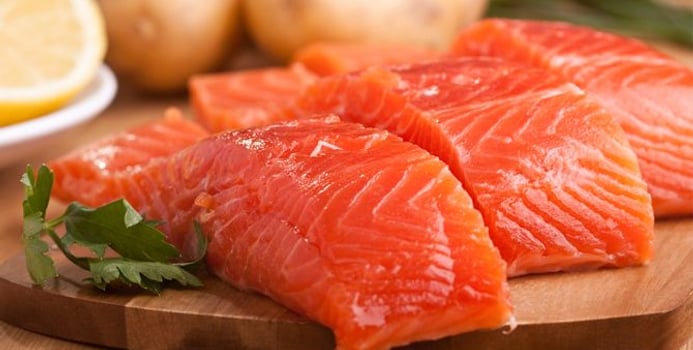All foods with fats in them contain varying amounts of polyunsaturated, monounsaturated and saturated fats. Some of the more beneficial types of fats are Polyunsaturated Fats (PUFAs). These dietary fats are associated with lowering total cholesterol, called LDL or "bad" cholesterol. However, they are also associated with lowering HDL cholesterol, or "good" cholesterol. Polyunsaturated fats are fatty acids that are missing two or more hydrogen molecules on their fatty acid chains. The more hydrogens a fatty acid chain is missing, the more unsaturated it is. Polyunsaturated fatty acids add beneficial effects to the diet, but they still contain calories, about 9 calories per gram and 120 calories per tablespoon.
Omega-3 Fatty Acids are some of the most well-known polyunsaturated fats. Omega-3s are associated with helping thin blood and preventing blood platelets from sticking to artery walls and clotting. In addition to lowering risk for heart attacks, blocked blood vessels and strokes, omega-3s may help prevent arteries from hardening, reducing blood pressure and lower the levels of triglycerides. They are also linked with keeping your brain and nervous system functioning normally. Omega-6 fatty acids are also polyunsaturated and some studies have shown that including omega-6s in your diet can help to reduce your risk of cardiovascular disease. Omega-3 fatty acids are found in some cold-water fatty seafood, flaxseed oil, canola oil and walnuts. Omega 6's are found in vegetable oils, some whole-grain products, nuts and some seeds.
Some of the foods with the most significant amounts of polyunsaturated fats include vegetable oils like safflower, sunflower, corn and soybean oils, as well as the following foods.
Flaxseed
Flaxseed is one of the best foods to consume for polyunsaturated fats and omega-3s. However, for your body to use the health benefits of this seed, you need to consume it ground or in oil form, or the seed will just pass through your body undigested. In a 2 tablespoon serving of ground flaxseed, you get 3.2 grams of Alpha-Linolenic Acid. About 35 percent of Alpha-Linolenic Acid is converted to omega-3s. Alpha-Linolenic Acid is a fatty acid that your body cannot make and is considered essential to build fats in the body. One serving of flaxseed also provides about 6 grams of total fat. For vegetarians or people who do not eat a lot of seafood, this can be a good alternative. Try it ground in oatmeal, breads, smoothies or added to homemade salad dressing! Flaxseed oil is not great for cooking due to a low smoke point, but can add flavor to your meals.
Walnuts
One serving of walnuts is about 14 halves, or 1 oz, and contains 2.6 grams of alpha-linolenic acid and 6 grams total fat. 1/3 cup has about 270 calories. In addition to having lots of B vitamins, walnuts have about 3g of MUFAs and 18g of PUFAs, 3.5g omega-3s and 14.8g omega-6s. Choose unsalted and enjoy the flavor of these healthy nuts as a snack, on salads, or for adding protein, fiber and phytonutrients to baked foods.
Salmon
Atlantic cold water-salmon is a good source of polyunsaturated fats, especially omega-3's, In a 3-ounce serving, salmon will provide 18 grams of omega-3s and 4 grams of both PUFAs and MUFAs. Per serving, salmon has 10.5 grams of fat, 2 grams of saturated fat, 54 mg of cholesterol and 175 calories.
Tuna
One of the more inexpensive and readily available foods high in polyunsaturated fats is tuna. In one serving of tuna you have 179 calories, 39g of protein, 433mg of omega-3s, 13.9mg of omega-6s. It is low in saturated fat, and high in vitamin B12, selenium and phosphorus. Choose tuna that has been canned in water for a lighter option.

Emily DeLacey MS, RD is a Registered Dietitian and currently working in Jamaica as a HIV/ AIDS Prevention Specialist. She attended Central Washington University for her Bachelor's Degree in Science and Dietetics and continued on after her internship to Kent State University for her Master's Degree in Science and Nutrition, with a focus on public health and advocacy. She served as a U.S. Peace Corps Volunteer in Malawi 2012-2014 working as a Community Health Advisor in a rural village, immersing in the joys of life without electricity or running water. She has been to 20+ countries and 47 of the 50 states in the US. Traveling, adventuring and experiencing new cultures has made her a passionate advocate for the equality of nutrition and wellness for all people.



